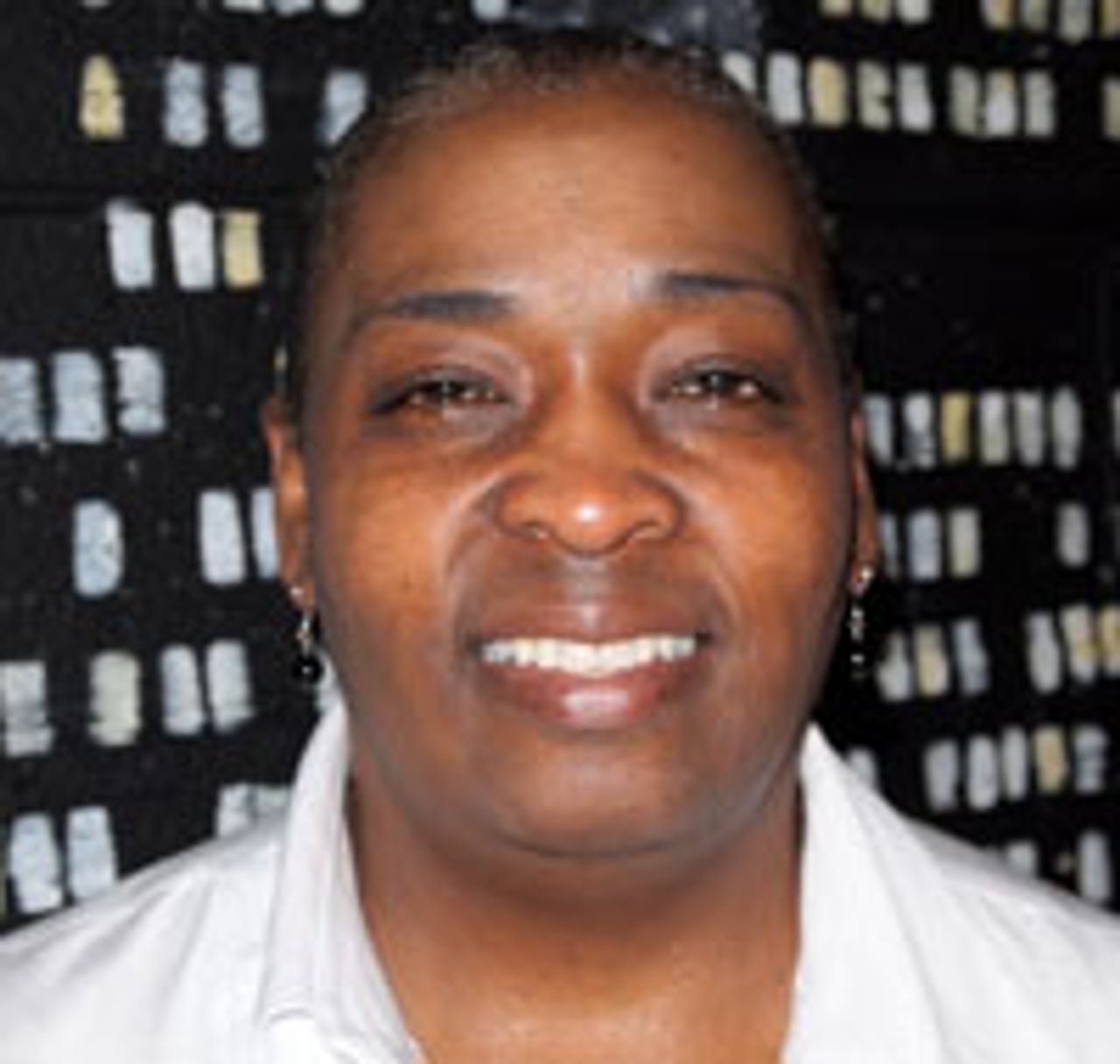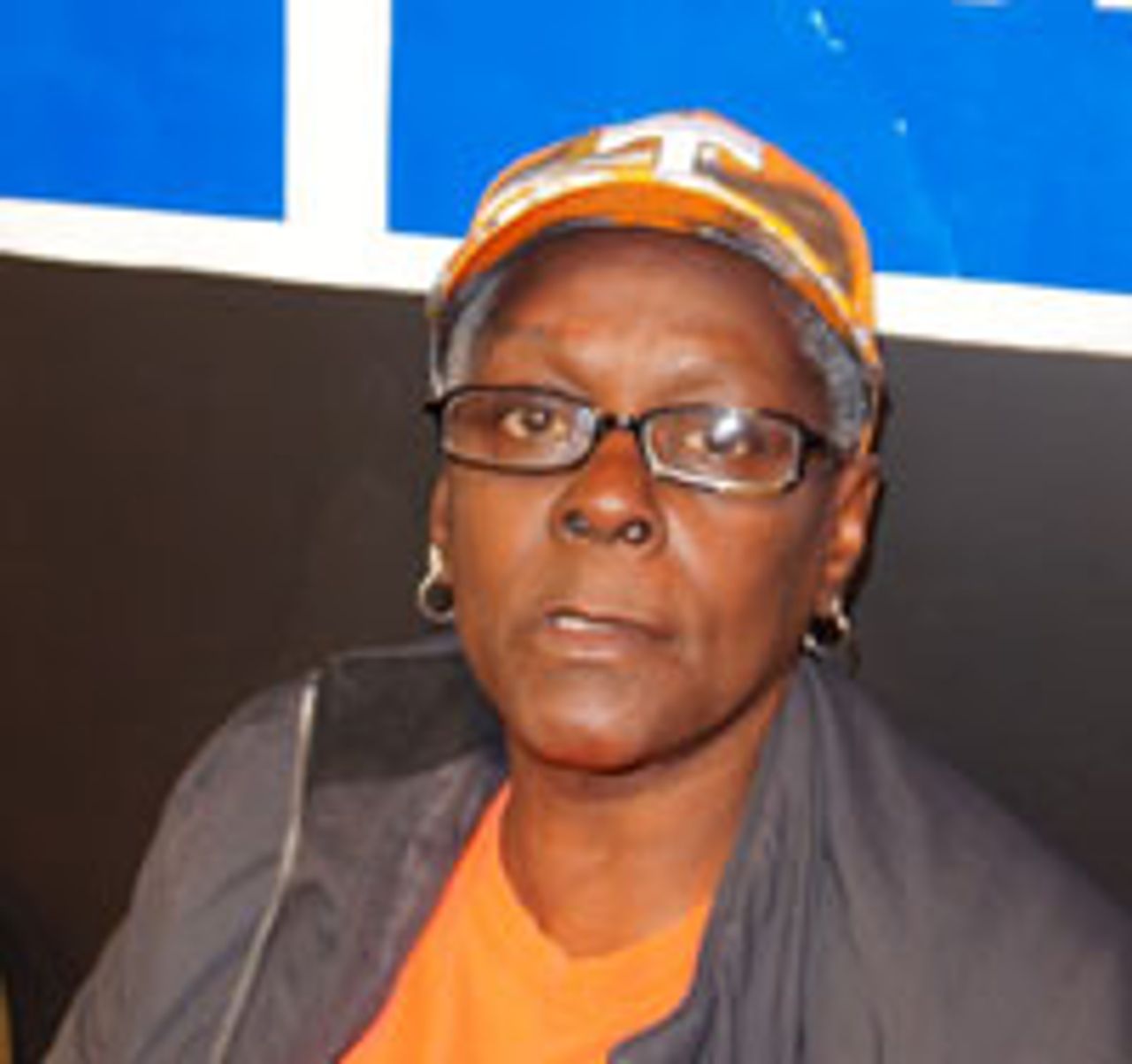Hundreds of Detroit area residents turned out Saturday at Bert’s nightclub in Detroit’s Eastern Market for free health screenings for diabetes, hypertension, dental, vision and other conditions. Project Healthy Living sponsored the event, aimed at the homeless, the unemployed and those facing foreclosure and eviction. Showers and clothing were also available, and licensed cosmetologists provided shampoo, haircuts and styling services.
The event attracted a cross section of people from the Detroit area. The large turnout speaks to the breadth and depth of the social crisis in Detroit, the poorest big city in America. A large number of those attending the event were either homeless or unemployed. Many lacked health insurance or had insurance that was inadequate.
 Velissa Perry
Velissa PerryVelisa Perry, assistant director of Project Health Living, spoke to the World Socialist Web Site. “This is a community effort. Bert is the owner who allowed us to use this place for free. This is our second year doing this.
“We have come together to help the homeless, the unemployed and the uninsured. We are offering a variety of services. We are offering free blood panels. We do low-cost health screenings. Most of our health screenings are going to be free. The blood panel we offer has a charge to it. It costs normally $700-$800; we offer it to the public for $50. The reasons we charge the $50 is because we send it out to Quest Diagnostics.
“We have a large population of people that are uninsured in Detroit. We offer services that you can’t really get at your doctor’s office. We do preventive. When you go to your doctor, you usually go with an ailment. He will draw blood based on that ailment. We do a profile that covers a lot of parts of your body, so we may catch something that is lying dormant.
“We have 45 sites in 9 counties where people can get these services. We will see between 15-20,000 people. Our goal is 500 today. Our season runs from March through May. And in our season we save over 150 lives. We have been doing this for 45 years.
“This program is called HOW – Helping Our Own. We have no corporate sponsors other than Channel 7. We don’t have a budget. I work 12 months; I don’t get paid. We feel that if we quit now the lives that we have touched won’t be touched any more.
WSWS: What percentage of the people in Detroit would be eligible for your services?
VP: Probably 75 percent of the people are unemployed, uninsured or homeless.
In the last 10 years it has been changing dramatically. We are just at a point now where there is so much need. We have people who have been working all their lives. I just met a woman who had raised her children, was married, had a beautiful home, had a beautiful career and she retired. Then her husband died and two years later and she lost her home. She was 74 years old and homeless.
WSWS: What kind of medical conditions are you seeing?
VP: We are seeing a lot of chronic conditions. We are seeing a lot of high blood pressure. We are seeing children at the age of five that are obese. We see a large range of the population, from children to adults. Detroit is considered a food desert. People are actually shopping in party stores and gas stations for meals.
The number with diabetes has gone down nationally, but in Detroit it has increased.
Most people who are unemployed are uninsured. Then the homeless percentage has increased dramatically. They are living in houses with no heat or lights. They are homesteading. There are people living in basements, in their neighbor’s basements. They aren’t considered homeless, but they really are homeless.
The problem of lack of access to health care is a problem all over the country. In Oakland and Macomb County we have more take part in Project Healthy Living than we do in Detroit. In some areas we have people come two hours early just to get in line and get a number, that’s how great the need is. We have grown twofold just since the beginning of this event last year. We have them standing outside, all over because of the need and because people are getting the word around.
The American dream is not here. I was told to go to school and you would get a job, a home and a car. That process is not real any longer. I have friends with degrees who are unemployed. They will be here sitting in this line today asking for help. So the promise is not here. I don’t understand this system, you have less, and you pay more.
The WSWS spoke to some of those attending the health screening. David Sulkowsi is a member of the Michigan National Guard who lives in Detroit. He said, “I am having a rough time. I am out looking for a civilian job right now. I know a lot of people who are coming today. It’s two different worlds between now and my parent’s time. There were a lot more jobs then.”
His friend Mathew Tallman added, “The job situation is horrible. There are hardly any jobs. You have to go past 8 or 9 Mile Road to get a job. With them cutting back on the bus service it is hard.”
 Gail McRaft
Gail McRaftGail McRaft, a former Chrysler worker, told the WSWS that she was now homeless. “I came today because of the health aspect. I was raised in Detroit. I have been here 54 years. I am disabled.
“I worked at Dodge Main making upholstery. I was 18 years old when I started; I am 63 now. I used to own my own business. I was a painter and a carpenter. Then I got old and I am in pain everyday. I have been homeless 34 days. I can’t get an apartment or a shelter.”
She was angry at the cuts being carried out in the city of Detroit. “I think that people in government and city officials that are getting big paychecks should cut that pay in order to give us the help we need.
“They have knocked the buses out. If you have to get to work at 3 or 4 in the morning you can’t because of the cuts.”
Telisa, who is disabled, told the WSWS, “I pay over $300 a month for medicine. I only get $900 a month and I have to pay the rent out of that. I have Medicaid, but it doesn’t cover some things so much of my money has to go to pay for medications.”
Lisa Krawczyk lives in Hamtramck. She said, “I don’t have health insurance and my unemployment runs out at the end of April. I am a home health aide. I am waiting for a decision if I can work, because my license is from another state.
“I got really sick around 2005-2008. I had stage 4 cancer. They removed the cancer. One year after that they cut me off Medicaid because they said I make too much money.
“Every year I come here. I don’t have the money to see a specialist. It costs like $250. I don’t have $250. Even if I got a job, it costs $300 a month to get good health insurance. That is like a car note or a house payment.
“You help the Big Three and the banks, you hand money to them, why can’t you help the people? The banks are making money off us. That’s no fair. They cut the bus drivers’ jobs on the weekends; they should cut the salaries of the city council. Why doesn’t Mayor Bing try living on $50,000 a year and see how that feels?
“I work with people with disabilities. They keep cutting their benefits and those of senior citizens. But those are the people who need the help.”
